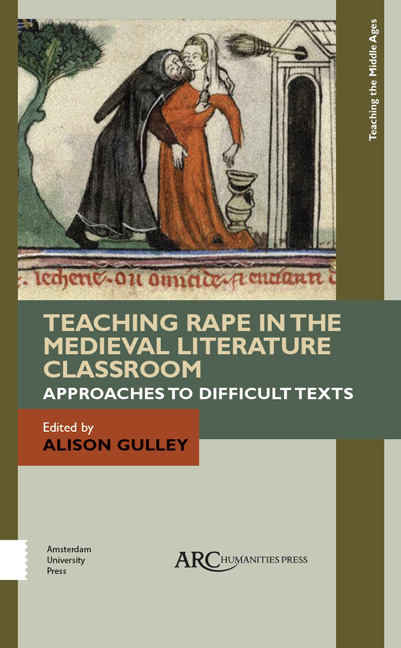Book contents
- Frontmatter
- Contents
- Acknowledgements
- Chapter 1 Introduction: Teaching Rape and Meeting the Challenges of the TwentyFirstCentury Classroom
- Chapter 2 Medieval Saints and Misogynist Times: Transhistorical Perspectives on Sexual Violence in the Undergraduate Classroom
- Chapter 3 Teaching Medieval Rape Culture across Genre: Insights from Victimology
- Chapter 4 Bringing the Bystander into the Humanities Classroom: Reading Ancient, Patristic, and Medieval Texts on the Continuum of Violence
- Chapter 5 From Bystander to Upstander: Reading the Nibelungenlied to Resist Rape Culture
- Chapter 6 Speech, Silence, and Teaching Chaucer’s Rapes
- Chapter 7 Classroom PSA: Values, Law, and Ethics in “The Reeve’s Tale”
- Chapter 8 “How do we know he really raped her?”: Using the BBC Canterbury Tales to Confront Student Skepticism towards the Wife of Bath
- Chapter 9 Teaching the Potiphar’s Wife Motif in Marie de France’s Lanval
- Chapter 10 Sexual Compulsion and Sexual Violence in the Lais of Marie de France
- Chapter 11 Troubadour Lyric, Fin’amors, and Rape Culture
- Chapter 12 The Knight Coerced: Two Cases of Raped Men in Chivalric Romance
- Chapter 13 Teaching Rape to the HeMan Woman Haters Club: Chrétien de Troyes at a Military School
- Chapter 14 Rape, Identity, and Redemption: Teaching “Sir Gowther” in the Community College Classroom
- Notes on Contributors
- Index
Chapter 4 - Bringing the Bystander into the Humanities Classroom: Reading Ancient, Patristic, and Medieval Texts on the Continuum of Violence
Published online by Cambridge University Press: 23 January 2021
- Frontmatter
- Contents
- Acknowledgements
- Chapter 1 Introduction: Teaching Rape and Meeting the Challenges of the TwentyFirstCentury Classroom
- Chapter 2 Medieval Saints and Misogynist Times: Transhistorical Perspectives on Sexual Violence in the Undergraduate Classroom
- Chapter 3 Teaching Medieval Rape Culture across Genre: Insights from Victimology
- Chapter 4 Bringing the Bystander into the Humanities Classroom: Reading Ancient, Patristic, and Medieval Texts on the Continuum of Violence
- Chapter 5 From Bystander to Upstander: Reading the Nibelungenlied to Resist Rape Culture
- Chapter 6 Speech, Silence, and Teaching Chaucer’s Rapes
- Chapter 7 Classroom PSA: Values, Law, and Ethics in “The Reeve’s Tale”
- Chapter 8 “How do we know he really raped her?”: Using the BBC Canterbury Tales to Confront Student Skepticism towards the Wife of Bath
- Chapter 9 Teaching the Potiphar’s Wife Motif in Marie de France’s Lanval
- Chapter 10 Sexual Compulsion and Sexual Violence in the Lais of Marie de France
- Chapter 11 Troubadour Lyric, Fin’amors, and Rape Culture
- Chapter 12 The Knight Coerced: Two Cases of Raped Men in Chivalric Romance
- Chapter 13 Teaching Rape to the HeMan Woman Haters Club: Chrétien de Troyes at a Military School
- Chapter 14 Rape, Identity, and Redemption: Teaching “Sir Gowther” in the Community College Classroom
- Notes on Contributors
- Index
Summary
Introduction
Every spring semester at The University of MontanaMissoula (UM), I teach a firstyear Women's and Gender Studies course entitled WGSS 163L Historical and Literary Perspectives on Women with an average enrollment of thirtyfive students. The “L” in the title indicates that the course fulfils a general education requirement as a Literary Studies course, and thus it always attracts a fair number of students (50 per cent) who are not necessarily seeking a degree in Women's and Gender Studies, but who have at least a passing interest in women's history and literature. In general, the class demographics are fairly typical of Women's and Gender Studies classes— primarily traditionalaged women (over 75 per cent) and LGBTIQidentified students majoring in the humanities and social sciences. This class serves as a feminist counterpart to UM's Great Books courses, LSH 151L Introduction to the Humanities I, and LSH 152L Introduction to the Humanities II. These two Liberal Studies courses are exactly that— an overview of canonical texts in the Western tradition. WGSS 163L engages with the same time periods (ancient through medieval and early modern to present) but few of the same authors.
In WGSS 163L, students read excerpts from the Bible, excerpts from the patristic theologians St. Jerome and Tertullian, and excerpts from the late fifteenthcentury witchhunter text Malleus Maleficarum by Heinrich Kramer and Jacob Sprenger as context for the world in which the ancient and medieval women authors I assign produced their works. In the medieval period, students read both The Selected Writings of Hildegard of Bingen and Christine de Pizan's Book of the City of Ladies. The learning outcomes for the course state:
1) Students will develop an understanding of the different ways Western societies and cultures have viewed and constructed gender, oppression, and privilege.
2) Students will learn to analyze social norms and institutions (including governments, educational systems, the church, and the family) as they relate to gender and other concepts such as sexuality, race, and class.
3) Students will develop an awareness of the role women authors have played throughout history and learn to evaluate texts authored by women within and against the context of the Western canonical tradition.
4) Students will develop critical thinking and communication skills through inclass discussions, exams, informal writing assignments, and online discussion forums.
- Type
- Chapter
- Information
- Teaching Rape in the Medieval Literature ClassroomApproaches to Difficult Texts, pp. 47 - 62Publisher: Amsterdam University PressPrint publication year: 2018



